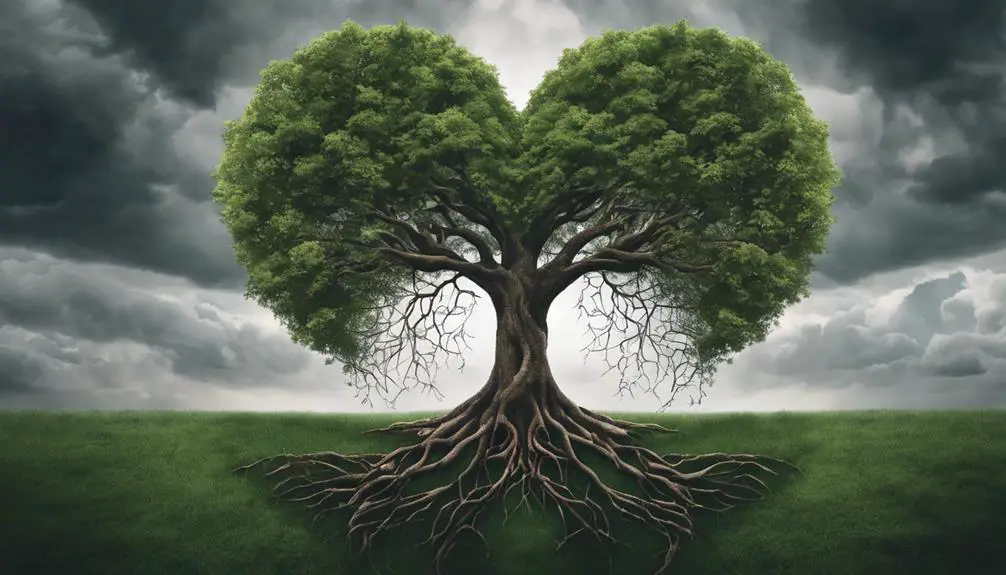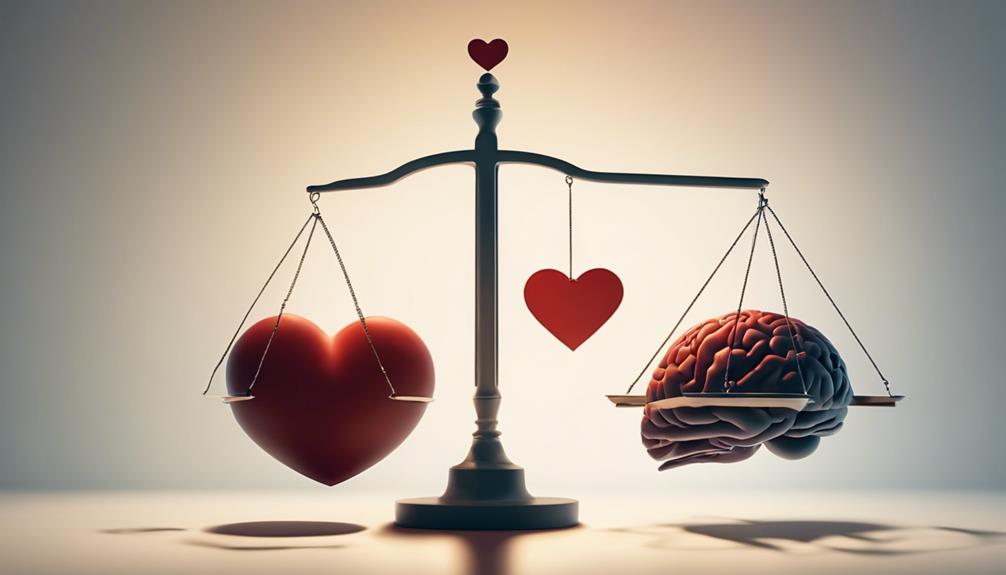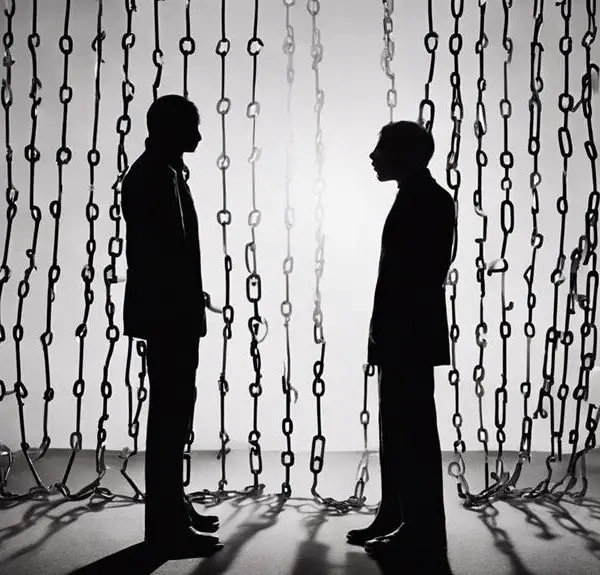Often seen as a spiritual poison, explore why hating others may be more than just a personal sin, inviting reflection and change.

Is It a Sin to Hate People?
Like a thorn in one's side, hate can be both painful and hard to remove. You've likely heard that harboring hate is akin to drinking poison and expecting the other person to die, but have you ever pondered whether it's considered a sin to hate people?
Various religious and ethical perspectives offer insight into this complex emotion, suggesting that the implications of hate extend far beyond personal discomfort. As we explore the roots of hatred, its impact on both individuals and communities, and the challenging journey towards overcoming it, you'll find compelling reasons to reevaluate your own feelings and their moral significance.
Key Takeaways
- Many religions equate hate with moral failings, promoting forgiveness and compassion instead.
- Ethical considerations view hate as having negative societal and personal impacts.
- Hate's origins in fear and ignorance underscore its moral and ethical problematic nature.
- Overcoming hate through self-reflection and empathy aligns with moral and religious teachings against it.
Understanding Hate

To fully grasp the nature of hate, it's essential to examine its origins and the psychological mechanisms that drive it. Hate's origins are deeply rooted in human psychology, often stemming from fear, ignorance, or past experiences. It's a potent emotion that can lead to severe emotional consequences, both for the individual who harbors it and those subjected to it. Understanding hate requires acknowledging its complexity and the multifaceted reasons behind its emergence.
The emotional consequences of hate are profound. It can consume your thoughts, leading to a cycle of negativity that impacts your mental health and well-being. When you hate, it's not just an external expression towards someone or something; it's an internal battle that affects your emotional equilibrium. This imbalance can manifest in various harmful ways, including stress, anxiety, and even depression.
Acknowledging the origins of hate and its emotional consequences is crucial in addressing and mitigating its impact. By understanding these aspects, you're better equipped to confront and overcome hate, fostering a more compassionate and empathetic perspective towards others and yourself.
Religious Perspectives
Understanding the psychological underpinnings of hate sets the stage for exploring how various religions interpret and address this potent emotion. Across faiths, the consensus leans towards promoting love and compassion, yet nuances in scriptural interpretations offer a rich tapestry of insights into divine forgiveness and the moral implications of harboring hate.
- Christianity teaches that hate is akin to murder in the heart, advocating for forgiveness and love for enemies as central to Jesus' teachings.
- Islam emphasizes compassion and patience, with the Quran discouraging hatred and encouraging believers to forgive others as they seek forgiveness from Allah.
- Buddhism views hatred as a poison of the mind, a barrier to enlightenment, urging followers to cultivate loving-kindness and compassion towards all beings.
- Judaism balances justice with mercy, encouraging individuals to move beyond personal grievances through understanding and forgiveness, acknowledging that hatred can corrupt the heart.
These religious perspectives share a common thread in valuing forgiveness and understanding over hatred. The emphasis on divine forgiveness across traditions underscores a universal call to transcend personal vendettas and prejudices. Through scriptural interpretations, believers are guided towards a path of compassion, highlighting the spiritual consequences of hate and the redemptive power of love.
Ethical Considerations

Beyond religious doctrines, ethical considerations play a pivotal role in how societies perceive and address the act of hating others. You're navigating the complex terrain of moral ambiguity when you evaluate hate through an ethical lens. It's not just about whether it's right or wrong; it's about understanding the layers and contexts that inform those feelings.
Aspect |
Ethical Question |
Societal Impact |
|---|---|---|
Intention |
Is the intent behind hate justified? |
Influences societal norms on conflict resolution |
Expression |
How is hate expressed? |
Affects the level of tolerance towards diversity |
Outcome |
What are the consequences of hate? |
Shapes the moral fabric of society |
In this framework, societal norms serve as both a mirror and a mold. They reflect the prevailing ethical standards and, concurrently, shape individual attitudes towards hate. You're encouraged to consider not just the act of hating, but also the underlying reasons, the manner it's expressed, and its potential outcomes. This analytical approach helps to dissect the layers of moral ambiguity surrounding hate. It prompts a deeper reflection on how societal norms influence, and are influenced by, our ethical stances on hate.
The Impact of Hate
Hate's impact on society is profound and multifaceted, influencing everything from interpersonal relationships to broader societal cohesion. When individuals harbor hate, it doesn't just stay contained within; it spills over, affecting numerous aspects of life and society.
Consider the following:
- Health Consequences: Holding onto hate can lead to significant health issues, including stress-related disorders and mental health problems. You're essentially putting your body and mind under constant strain, which can wear down your overall well-being over time.
- Social Divisiveness: Hate fuels division among communities, creating an us-vs-them mentality. It undermines social harmony and makes it challenging to work towards common goals.
- Economic Impact: When hate leads to discrimination or violence, it can have a tangible economic cost, from damaged property to lost productivity and legal expenses.
- Political Polarization: Hate can exacerbate political divides, making it difficult for people to find common ground or engage in productive dialogue. This polarization can stall progress on important issues.
Understanding the impact of hate is crucial. It's not just about how you feel internally; it's about the ripple effects those feelings can have on the world around you.
Overcoming Hatred

Overcoming hatred requires a deliberate, thoughtful approach that starts with recognizing and addressing one's own prejudices and negative emotions. It's a personal journey that demands honesty and the willingness to confront uncomfortable truths about oneself. Self-reflection techniques play a pivotal role in this process, serving as tools to unearth the roots of one's animosity. Through practices like journaling, mindfulness meditation, and engaging with diverse perspectives, you can gain insights into why you feel hatred and how these feelings impact your behavior and relationships.
Empathy cultivation is another crucial aspect of overcoming hatred. It involves striving to understand the experiences, feelings, and motivations of others, even those you might consider adversaries. By putting yourself in someone else's shoes, you can begin to see the humanity in everyone, which can significantly diminish feelings of hate. This doesn't mean you must agree with everyone or condone harmful actions, but rather, it's about recognizing the complexity of human emotions and experiences.
Both self-reflection and empathy cultivation require patience and persistence. They're not overnight solutions but rather ongoing practices that can lead to profound personal growth and healthier relationships. By committing to these approaches, you're taking significant steps toward not just overcoming hatred, but fostering a more compassionate and understanding world.
Frequently Asked Questions
How Does Societal Influence Shape Our Perceptions of Hate Towards Certain Groups or Individuals?
Societal influence significantly shapes your perceptions by creating a narrative that fosters hate origins towards certain groups. It cultivates an empathy deficit, making it challenging for you to see beyond preconceived biases and stereotypes.
Can Hating Someone Secretly, Without Outwardly Expressing It, Still Have Negative Personal Consequences?
Yes, harboring hate secretly can still affect your emotional health negatively. It prevents effective conflict resolution and can lead to internal turmoil, impacting your well-being and relationships, even if you don't express it outwardly.
Are There Psychological Benefits to Acknowledging Feelings of Hate Rather Than Suppressing Them?
Acknowledging feelings of hate, rather than suppressing them, can improve your emotional health. Engaging in therapeutic dialogue helps process these emotions constructively, offering a balanced approach to understanding and managing negative feelings more effectively.
How Do Cultural Differences Affect the Interpretation of Hate and Its Acceptability in Various Communities?
Cultural differences greatly influence how communities interpret hate, introducing variability in its acceptability. You'll find that cultural empathy plays a crucial role in understanding these nuances, promoting a more balanced and scholarly analysis of hate's impact.
Can the Concept of Hate Be Completely Eradicated From Human Behavior, or Is It an Inherent Part of Our Nature?
You might find that evolutionary psychology suggests hate's origins are deeply embedded in human nature, making complete eradication unlikely. It's a complex blend of survival instinct and societal influence that shapes our behaviors.
Conclusion
In conclusion, while navigating the complexities of hate, it's crucial to acknowledge its profound implications. Religious teachings often warn against the corrosiveness of hate, urging compassion and understanding instead.
Ethically, harboring hate contradicts principles of respect and empathy, eroding societal bonds. The impact of hate, both personally and communally, can be devastating, highlighting the importance of striving toward overcoming such feelings.
Ultimately, embracing empathy and understanding is pivotal in mitigating hate's destructive effects, fostering a more harmonious coexistence.



Sign up